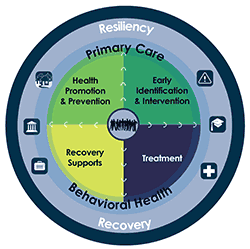History & Overview
The New Hampshire Department of Health and Human Services (DHHS), Bureau of Drug and Alcohol Services (BDAS) is supporting the development of a robust, effective, well-coordinated and accessible Continuum of Care (CoC) for substance use disorders in each Regional Public Health Network (RPHN) in the state. This scope of work, guided by a fulltime regional CoC Facilitator, aims to ensure the availability of and/or access to substance misuse services (health promotion, prevention, early identification and intervention, treatment, recovery support services) for all citizens in every RPHN community.
In the Capital Area, Ashley Sullivan, the Substance Use Disorder Continuum of Care Facilitator, is guiding efforts on behalf of the Capital Area Public Health Network in coordination with the Capital Area Substance Use Disorder (SUD) Continuum of Care (CoC) Work Group. Through this Work Group, a committed group of key stakeholders from the Capital Area are meeting on a bi-monthly basis to begin developing systems change concerning SUD service delivery in our region. Dedicated medical providers, law enforcement chiefs, EMS first responders, prevention specialists, treatment and recovery experts are working to prioritize evidence-based programs and practices, advance the coordination of services among partners, and promote community engagement on SUD issues.
The CoC Work Group was originally established with Peter Evers, CEO Riverbend, CAPHN, Concord Hospital providers and other key SUD stakeholders in 2015, recognizing that SUD Treatment and Mental Health were functioning in silos and that 70% of those struggling with SUD had co-occurring mental health issues that needed to be addressed as well. Since the CoC Work Group’s inception, great work has been done to address critical issues, policies, training and workforce shortages, and financial barriers. This is just the beginning and much more work needs to be done. Through partnerships, collaboration and dedication to assisting those with mental health and substance use disorders, the CoC Work Group will continue its work to help make the Capital Region and NH communities healthy, vibrant and productive.
Current Strategies:
Current new initiatives include collaborating with the NH Provider's Association and members of the Capital Area Public Health Network to:
1. Identify current systems of care being offered throughout the region.
2. Discuss how we can improve awareness and access to those services and identify gaps or barriers to people getting services.
3. Build capacity locally and regionally to fill those gaps and provide better communication between partners and a smoother transition from one area of service to the other. This work will include wrapping in Behavioral Health experts as well as Medication Assisted Treatment (MAT) providers and Emergency Service providers to build a more robust system of services on the continuum.
Resources:
Continuum of Care Development in NH and the Capital Area
Capital Area Continuum of Care Development Plan
State of NH Recovery Resource Guide
For more information on any of the above initiatives, please contact Ashley Sullivan at ashley.sullivan@graniteuw.org or 603-224-2595 x308.